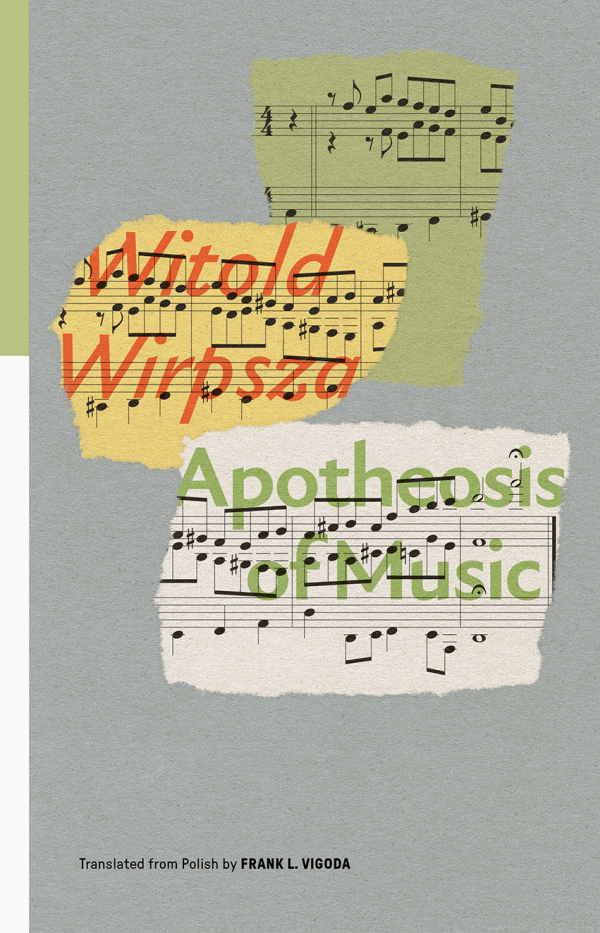Wipsza’s dream-like poems are absurd, but if you pay attention to the material from which these dreams are made, you’ll find them lingering with you in unexpected ways.

Witold Wirpsza | Apotheosis of Music | translated by Frank L. Vigoda | World Poetry Books: £18.99
Reviewed by Dylan Stewart
Witold Wirpsza was a Polish poet who lived from 1918 to 1985. He was born in Odessa, in
Ukraine, at the time caught up in the Russian Civil War and died in West Berlin. These facts alone tell a story. He was born amid a conflict over imperialism, totalising ideology, and the struggle for nationhood. He died an exile from his home country, unable to return. Apotheosis of Music is the first collection of his poetry translated into the English language, in it, all of the above facts are present just below the page. However, also present is a voice which is often sinuous and challenging but is also playful and human.
But maybe to talk about Wirpsza’s voice in the singular gets us off on the wrong foot, in
Wirpsza we find a variety of voices and a variety of different modes of doing poetry. At
times, the poems are dream-like and absurd, filled with a wide variety of potent images from dancing dwarves to Damascus steel; yet, at others his poems have complete focus on a singular point, often political or philosophical. However, to treat these modes as completely separate would be a mistake; the dream-like poems are absurd, but if you pay attention to the material from which these dreams are made, you’ll find that they are not random. For instance, ‘Stalin at the crossroads’, the second part of ‘Apotheosis of Dance’, takes place in medieval Europe and follows Joseph, a man taken as a slave by the Saracens and forced to produce Damascus steel. He becomes obsessed with the steel and takes a new name from it, ‘Stalin’. Once he’s a free man once again, he wanders Southern England as a sentimental poet until he is confronted with what appear to be a pack of wolves at a crossroads. He murders them. In the morning, it is discovered that a number of women have been decapitated at the crossroads. Stalin is never seen again.
This story is not complete nonsense, there is a unity to its symbols, and it seems to be saying something of contemporary relevance. However, it is also not a straightforward analogy or parody of the violence and oppression of Stalin’s regime. I think it is best to read these poems as reactions to, refractions of, the material which made up Wirpsza’s thoughts. Wirpsza lived through an unstable and tragic time – that he transformed that tragedy into an act of imagination, something enjoyable, a fairy tale, shows his strength of character, his irrepressible individuality, to take hold of the people and the violence that have subjugated so many and make it the subject of your own free creation. There’s something admirable, inspirational about Wirpsza’s dreams.
Wirpsza is self-aware of his place as a single individual trying to preserve himself in the face of unwelcome intervention. In the more focused poems that I mentioned earlier, individuality is often a major theme. In one poem, Wirpsza tells the tale of a man embedding a white worm in his friend’s head, causing migraines and constant paranoia even after the worm has passed. He does this as punishment for trying to improve the moral character of his friend, embedding in his head the idea that he isn’t yet good enough. In another poem, Wirpsza speaks about the transformations, both bodily and of the mind, that he will be made to go through by pedagogues, in order to become ‘highly talented’ and to ‘match society’s happiness’. He says this all with a forced smile, barely hiding his fear and hatred. There is something in Wirpsza’s dark but shining imagination, his cynical humanism, that reminds me of Dostoyevsky, a man who also knew that man’s final desire, even once everything else is fulfilled, is to disobey.
However, Wirpsza’s love of disobedience isn’t an anti-intellectualism. The variety of
references in his poetry show him to be a well read, intellectually engaged man. He has a love of music and a love of the individual artist, both of which feature in his poetry. As well as Stalin, in ‘Apotheosis of Dance, we find Plato, Beethoven and Dante, all transformed in
outlandish ways. A number of poems focus on the effect that listening to and playing music
has on the human being. In fact, in his poem ‘Self Portrait’ he seems to make the case that
poetry is more comparable to music than to painting or drawing. All of this comes together in my favourite poem of the collection, ‘A Monologue by Wolfgang Amadeus Mozart’ in which Wirpsza takes up the voice of Mozart who reveals that he did not die in 1791 but in fact lived until at least 1844, when the monologue is given. Mozart recalls seeing his reputation change from that of a ‘provincial musician’ into a beloved genius. The image of an old Mozart, going blind and deaf, sitting on the stone steps outside a church, listening to his music that is no longer truly his, played to an audience who both loves and does not recognise him, has stuck with me. It shows Wirpsza’s inventiveness, love of the individual, and understanding of the absurdity of life – all qualities that make this collection valuable.
Reviewed by Dylan Stewart
